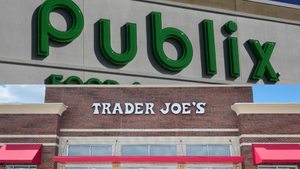- Retail Labor
- Grocery Trends & Data
- Legislation & Regulatory News
- Grocery Operations
- Foodservice at Retail
Loss of ‘hero pay’ resurfaces in Metro contract talksLoss of ‘hero pay’ resurfaces in Metro contract talks
Fresh Perspectives: Grocery workers still feel the sting after retailers rescinded pandemic-driven wage hikes.


“Fresh Perspectives” is a new Winsight Grocery Business column from Executive Editor Russell Redman, who will share insights on news, trends, people, issues and events in and around the grocery industry.
When you give someone something, it’s awfully hard to take it back.
That seems to be the sticking point in negotiations as the strike by over 3,500 grocery workers of Unifor Local 414 at 27 Metro supermarkets in greater Toronto nears one week. The stores remain closed. Canada’s Financial Post reported this week that Local 414 President Gord Currie said members want the rescinded $2-per-hour wage hike paid during the pandemic—aka “hero” or “bonus” pay—reinstated.
Unifor 414’s negotiating team and Metro had announced a tentative contract deal shortly after midnight on July 19. The union had set a deadline of 11:59 p.m. the day before to go on strike if talks didn't result in an agreement. Ratification votes were held from July 23 to 28, but Unifor said terms of the proposed contract didn’t meet members’ expectations.
Currie had told the Financial Post that the preliminary accord included a $3.75 wage increase over four years, which he described as “the best we’ve had in 25 years.” That entailed a $1.05 lift in year one, followed by 90-cent hikes in each of the next three years. Similarly, part-time workers would get $2.75 over four years. However, in talks on the proposal, Local 414 members were dismayed about not getting that $2 boost in the first year. “They made no bones about that,” Currie said to the Post. Hence, members opted to strike.
It’s not hard to understand this stance here in the U.S. grocery market. Unionized grocery retail workers still feel the sting of losing the $2 hourly wage increase (in some cases $1) provided amid the pandemic by retailers of all sizes, ranging from mass chains and national and regional grocers on down to smaller supermarket chains and independents. United Food and Commercial Workers (UFCW) and other unions fought hard to keep this “hazard pay”—noting that workers continued to face the scourge of COVID-19 on the job while companies benefited from booming grocery sales—but retailers by and large stayed on course to phase out the extra pay.
We might be seeing the byproduct of that dispute. Since then, UFCW and other industry unions, including Teamsters, have been firm in contract talks—buoyed by strong public regard for frontline grocery workers and ongoing robust food-at-home sales—and achieved excellent results in winning higher wages, improved benefits and better working conditions, including for part-time staff. Their leverage likely will strengthen, as elevated food prices—despite declining inflation—have a lot of consumers casting a skeptical eye at the grocery industry.
About the Author
You May Also Like






